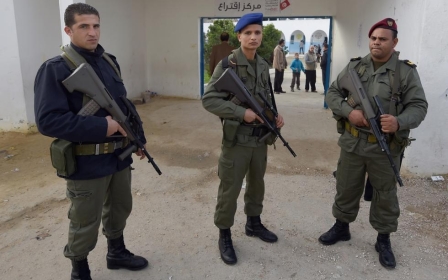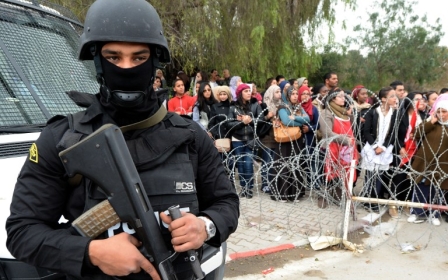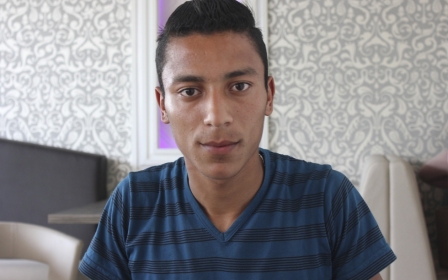Was IS involved in the Tunis army barracks massacre?

Government assurances that a fatal shooting in Tunis earlier this week was not linked to the Islamic State (IS) group are under scrutiny after the group appeared to take credit for the attack and local reports offered accounts that contradicted the official narrative.
On Monday, Mehdi Jemai, a corporal in the Tunisian military, reportedly seized a rifle from a soldier in the Bouchoucha barracks in Tunis’ Bardo district, and killed seven fellow soldiers. Ten others were wounded.
Jemai was shot by security services during the attack.
Immediately after the attack, government officials said the attack was not an act of terrorism and suggested that Jemai was psychologically disturbed.
“The incident which took place at the Bouchoucha barracks is not connected with a terrorist operation," Ministry of the Interior spokesman Mohamed Ali Aroui told AFP.
Defence Ministry spokesman Belhassen Oueslati said Jemai "had family and psychological problems" and as a result, had been "forbidden from carrying arms," and given "non-sensitive duties".
On Tuesday morning, the IS militant group published a note, since removed, on the justpasteit site, praising the actions of a “lone Muslim lion” who it claimed had previously, albeit unsuccessfully, tried to fight with the group in Syria and had been acting under its aegis since.
The extremist group’s apparent claim of responsibility for the Bouchoucha attack would appear to be supported by a 23 May call from its al-Afrikiyya media platform for attacks on Tunisian security personnel and specifying the military barracks at El Gorjani and Bouchoucha.
In the aftermath of the attacks, Tunisian blogger Yassine Ayari told local media that the “family and psychological problems” that government officials had disclosed were linked to his estranged wife, who Ayari said had informed Tunisia’s security services about his contact with IS.
“Following these allegations,” Ayari told Tunisia Live, “he was moved to a different department and his access to weapons was restricted.”
If accurate, legitimate questions can be asked not only of the Tunisian government’s prior knowledge of the security threat posed by Jemai, but also to what degree that knowledge may have shaped their public account of Monday’s atrocity.
The Tunisian Ministry of the Interior declined to comment on these questions.
Occurring just two days after President Beji Caid Essebsi’s return from a high-profile US visit, Monday’s attack will come as a significant blow for a government still reeling from March’s devastating assault on the country’s Bardo Museum, which killed 21. Security and trade concerns are understood to have been focal points of the president’s US visit and word of a further attack within the country’s capital cannot be welcome news.
Perhaps more ominous still is the suggestion that Monday’s attack may have originated from conversations between Jemai and IS, rather than Tunisia’s dominant, al-Qaeda-sponsored Okba Ibn Naffi Battalion.
IS involvement, however distant, in the attack would mark a further signalling in the group’s ambition to extend its existing Libyan front into North Africa’s most celebrated democracy.
Aaron Zelin, a fellow at the Washington Institute for Near East Policy who analyses contemporary militant movements, and two other analysts suggested in an report earlier this month that IS ultimately aims to create a new base in "Wilayat Ifriqiya," an Arabic term for the region, incorporating Tunisia as well as northwest Libya and northeast Algeria.
Ludovico Carlino, a Middle East and North Africa analyst at IHS Country Risk, told Middle East Eye: “While the influence of al-Qaeda and AQIM [al-Qaeda in the Islamic Maghreb] in Tunisia is fading, the Islamic State’s appeal is getting stronger.”
“IS is betting on expanding its presence across North Africa, and Tunisia is a key element of this equation. Besides the presence of IS-affiliated groups in the country, we have seen Tunisian jihadists on social media repeatedly calling for the establishment of an Islamic State wilaya [province] in Tunisia.”
However, according to Carlino, a new Islamic State front in North Africa may mark a departure from the previous conquest of territory that has defined the group’s strategy in Iraq and Syria. “I think partially it is propaganda, but it’s propaganda ‘by action’. The Islamic State aims at pushing local jihadists to set up local pro-IS groups … in other countries, especially across North Africa.
"It is part of the strategy of extending the geographical reach of the Caliphate. Once local wilaya are established, the Islamic State is probably able to transfer some kind of assistance to them, as in Egypt or Libya for example.”
Issam Dardouri, president of the Tunisian Organisation for Security and Citizenry, an NGO that liaises between the government, public and security services, told MEE – as he has said on Tunisian television – that he believes IS has infiltrated Tunisia’s security establishment.
“I don’t know how many security officers are actually in direct communication with Daesh [IS]; definitely some, but they’re popular,” Dardouri told MEE.
“Daesh or al-Qaeda both are terrorist groups and you can't really tell who's more popular among the police or army, but Deash seem more 'brutal and bloody' than al-Qaeda ... and they found some members among the ministry of interior who favour Daesh.”
Last July, 120 members of the Ministry of the Interior were reportedly dismissed after being implicated in “terrorist” activities.
New MEE newsletter: Jerusalem Dispatch
Sign up to get the latest insights and analysis on Israel-Palestine, alongside Turkey Unpacked and other MEE newsletters
Middle East Eye delivers independent and unrivalled coverage and analysis of the Middle East, North Africa and beyond. To learn more about republishing this content and the associated fees, please fill out this form. More about MEE can be found here.




